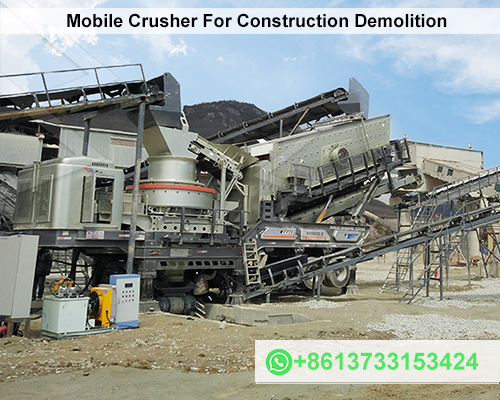Mobile Crushing and Recycling Equipment for Construction Demolition
In recent years, the construction and demolition (C&D) industry has witnessed a growing emphasis on sustainability and waste management. One of the key components in achieving these goals is the use of mobile crushing and recycling equipment. This technology not only helps reduce the environmental impact of construction waste but also offers economic advantages for contractors and builders. In this article, we will explore the benefits, types, and applications of mobile crushing and recycling equipment in the context of C&D operations.

The Need for Mobile Crushing and Recycling
Construction and demolition activities generate a substantial amount of waste, including concrete, asphalt, bricks, wood, and metals. According to the U.S. Environmental Protection Agency (EPA), C&D debris accounts for approximately 25-30% of the total waste stream in the United States. Traditional disposal methods, such as landfilling, can be costly and environmentally harmful.
Mobile crushing and recycling equipment addresses these challenges by allowing contractors to process waste on-site, transforming it into reusable materials. This not only reduces the volume of waste sent to landfills but also conserves natural resources by producing high-quality recycled aggregates for use in new construction projects.
Benefits of Mobile Crushing and Recycling Equipment
- Cost Savings: By recycling materials on-site, companies can significantly reduce transportation and disposal costs associated with waste. Additionally, the use of recycled aggregates can lower material expenses for future projects.
- Environmental Impact: Recycling helps divert waste from landfills, reducing environmental pollution and conserving resources. Using recycled materials also minimizes the need for new raw materials, contributing to sustainable construction practices.
- Versatility: Mobile crusher can handle a variety of materials, including concrete, asphalt, and mixed debris. This adaptability makes them suitable for diverse job sites and project requirements.
- Time Efficiency: On-site processing eliminates the need to transport waste to recycling facilities, saving time and speeding up project timelines. This allows contractors to complete jobs more efficiently.
- Quality Control: Modern mobile crushing equipment is designed to produce high-quality recycled materials that meet industry standards, ensuring that contractors can confidently use them in new construction projects.
Types of Mobile Crushing and Recycling Equipment
- Mobile Jaw Crusher: Ideal for primary crushing, mobile jaw crusher is designed to break down large materials, such as concrete and asphalt. They are equipped with powerful engines and hydraulic systems, enabling them to handle tough materials with ease.
- Mobile Impact Crusher: These machines use impact force to crush materials, making them suitable for a wide range of applications. They are particularly effective for processing asphalt and mixed debris, producing high-quality recycled aggregates.
- Mobile Screening Plants: Often used in conjunction with crusher, mobile screening plants separate materials by size, allowing contractors to produce specific grades of recycled aggregates. This equipment helps ensure that the final product meets project specifications.
- Mobile Feeders and Stackers: These machines are used to transport materials to and from crushing and screening equipment, enhancing the efficiency of the recycling process.
Applications in Construction Demolition
Mobile crushing and recycling equipment is utilized in various stages of construction demolition, including:
- Building Demolition: As structures are taken down, mobile crusher can process concrete and steel on-site, allowing for immediate reuse of materials in new projects.
- Road and Pavement Removal: When roads and pavements are resurfaced or demolished, mobile equipment can quickly crush and recycle asphalt, providing reusable materials for future road construction.
- Land Clearing: Mobile crusher can handle mixed debris generated during land clearing operations, making it easier to prepare sites for new construction.
Conclusion
The adoption of mobile crushing and recycling equipment is transforming the construction demolition industry. By reducing waste, lowering costs, and promoting sustainability, this technology offers significant benefits to contractors, builders, and the environment. As the industry continues to evolve, the use of mobile crushing and recycling equipment will likely become increasingly common, paving the way for a more sustainable future in construction.









